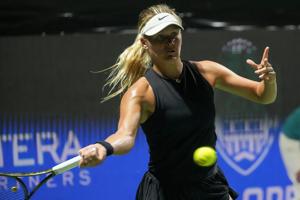
PARIS — Like many a kid, Peyton Stearns enjoyed participating in sports and tried her hand at plenty.
“Soccer, gymnastics, basketball, tennis, whatever,” the 21-year-old American said Wednesday at the French Open after eliminating 2017 champion Jelena Ostapenko 6-3, 1-6, 6-2 to reach the third round at a Grand Slam tournament for the first time.
Then Stearns paused, before adding with a chuckle: “Well, not so much tennis.”
By her own admission, she came to tennis relatively late for someone who would end up at its highest level, starting private lessons at age 8. It wasn’t until about three or four years later, the 2022 NCAA champion for the University of Texas explained, that she decided to focus on holding a racket.
“Gymnastics was very structured. I didn’t like that so much. I liked to do what I want when I wanted,” said Stearns, who had never played in the French Open’s main draw until this week and next faces No. 9 seed Daria Kasatkina, a 2022 semifinalist. “I chose tennis because I loved that you can just hit the living daylights out of the ball.”So that’s what she does, and did quite effectively against the 17th-seeded Ostapenko, outhitting a big hitter — Stearns compiled more winners, 30-29 — and leaving the field at Roland Garros with just one remaining woman who has won the title there: No. 1 Iga Swiatek, the champion in 2020 and 2022, who plays her second-round match Thursday. Barbora Krejcikova, the 2021 winner, lost in the first round.
People are also reading…
“Sometimes I surprise myself with how lethal my ball comes off (the racket) sometimes for my opponents, and how it really puts them in trouble,” Stearns said. “Maybe I didn’t realize that earlier on, but playing against top players, I realize that it is true. It comes off pretty heavy and big and that’s how I play. Definitely helps with confidence.”
Her victory over Ostapenko can be placed alongside a slew of other early upsets in Paris, where the sometimes-odd bounces of the red clay and the changing weather conditions can contribute to unexpected outcomes.
No. 5 seed Caroline Garcia of France was defeated by Anna Blinkova 4-6, 6-3, 7-5, and 18 of 32 seeded women already were gone before the second round was finished. In the men’s bracket, No. 2 seed Daniil Medvedev bowed out Tuesday against a qualifier ranked 127nd.
“I feel like at Roland Garros, it’s tricky with the clay,” said No. 3 Jessica Pegula, who advanced Wednesday when her opponent, Camila Giorgi, stopped playing because of knee pain after dropping the first set. “You can see — to me, it feels like — a lot more upsets.”
Do not tell Stearns hers was a stunning result, even though she is ranked 69th in her first full season on tour and carried a 0-1 career Slam record into this week.
“I expected this out of myself. Maybe not this early in my career. … I’m ahead of what I projected myself doing,” she said, “but by no means cutting myself short.”
She had her own little cheering section at Court 14, a group that included her mother, Denise, Stearns’ coach, her coach’s girlfriend and a friend, which helped.
So did Stearns’ boundless self-belief, which she said allowed her to settle down amid some feelings she described as “crazy, nerve-wracking, overwhelming — all the emotions into one.”
Her tennis idol growing up was Maria Sharapova, who won five Grand Slam titles and reached No. 1 in the WTA rankings.
Sharapova was a powerful ball-striker who found her initial success on faster surfaces such as grass courts, winning Wimbledon at age 17, and hard courts, her next major championships coming at the U.S. Open and Australian Open. But Sharapova eventually did collect two French Open titles later in her career.
That’s not why Stearns came to be a fan, though.
“My mom and I loved watching her because of her outfits,” Stearns said with a snicker. “My mom’s a big shopper.”
DJOKOVIC: Novak Djokovic sure seemed like someone ready to move on from the latest non-tennis issue he’s been involved in during a Grand Slam tournament. Criticized after his previous match for comments about clashes in northern Kosovo between ethnic Serbs and NATO-led peacekeepers, the 22-time major champion stayed away from political matters.
When his 7-6 (2), 6-0, 6-3 victory over Marton Fucsovics in the second round of the French Open ended, Djokovic, a 36-year-old from Serbia, wrote on the lens of a TV camera — a custom at more and more tennis tournaments — and kept it simple, with an autograph and a smiley face.
It was quite different from what happened after his win Monday, when Djokovic drew attention for writing in Serbian, “Kosovo is the heart of Serbia. Stop the violence,” and then speaking out about the matter at a news conference with reporters from his home country.
That drew rebukes from a member of France’s government, French Open tournament director Amelie Mauresmo and the Kosovo tennis federation.
Sports Minister Amelie Oudea-Castera warned Djokovic on Wednesday morning not to wade into such international issues again at Roland Garros, saying his comments were “not appropriate.” Speaking on TV station France 2, Oudea-Castera said Mauresmo encouraged Djokovic and his entourage to maintain “neutrality” on the field of play.
Asked about Oudea-Castera and Mauresmo, Djokovic responded: “I have no more comment on that. I said what I needed to say.”
Stay connected with us on social media platform for instant update click here to join our Twitter, & Facebook
We are now on Telegram. Click here to join our channel (@TechiUpdate) and stay updated with the latest Technology headlines.
For all the latest Sports News Click Here
For the latest news and updates, follow us on Google News.
